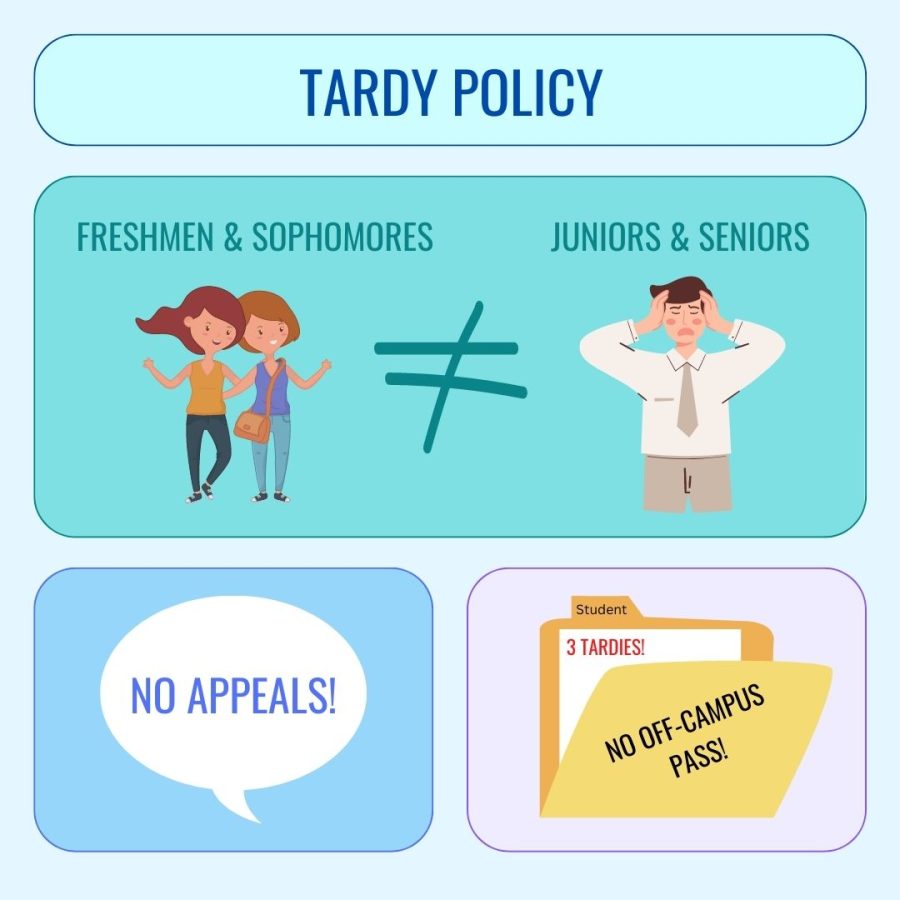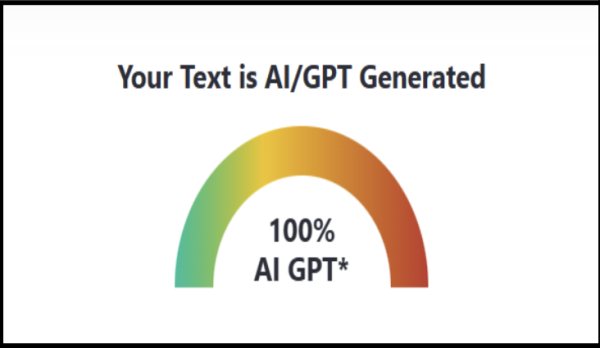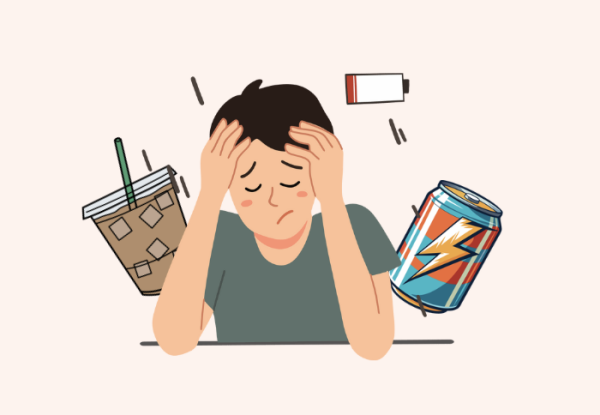Opinion: CHS needs a more uniform tardy policy
With an increase in morning traffic this year due to local construction and an earlier start time on traditional Mondays, arriving to class on time is often easier said than done. To decrease unnecessary stress, the new administration should create a more universal and forgiving policy that is equitably applied across all grades.
The current CHS Attendance Policy states that teachers get to determine if a tardy is excused or not. Based on this policy, there is not an option to appeal a tardy.
“Some teachers might say if you’re not in your seat when the bell rings, you’re late […], but at the same time […], a kid might show up five minutes late and the teacher never marks them tardy,” said Assistant Principal of Student Safety, Facilities and Athletics Tyler Lee. “Legally speaking, if you’re late to class then it’s a tardy, but an administrator has no way of enforcing that.”
Despite apparent traffic and bell schedule changes, CHS admin has clamped down on safety and attendance policies, mainly for upperclassmen. One of the requirements for an Off-Campus Pass, which allows off campus privileges for upperclassmen, is that students have two or fewer tardies or absences in each five-week period. Only in the context of the Off-Campus Pass can students appeal a tardy. Even then, Off-Campus Passes are only open to juniors and seniors.
While tardies impact a junior or senior’s eligibility for an Off-Campus Pass, there is little direct consequence for underclassmen tardies. Before the Off-Campus Pass system this year, all students, not just freshmen and sophomores, were largely unaffected when they were tardy.
“Previously, what would ever happen with the tardy?” said Lee. “Kids were just tardy. And it was […] up to a teacher’s discretion what to do with a tardy.”
By rewarding upperclassmen with the privilege of the Off-Campus Pass, admin encourages students to take responsibility for their own attendance and be on time for class. However, a more uniform policy may be more appropriate to keep all students aware of attendance expectations while offering a fair appeal system.
“I feel like for some students, [being late] can be stressful because some students have different schedules,” said junior Sinara Hewamadduma. “And maybe some students cannot get here until later, and then the traffic and the construction don’t help because it will make them late. They also might not be able to leave early due to other circumstances that they can not help.”
For students without D’s or F’s in the previous grading period, a first-time tardy should not count, and should only amount to a “first-time tardy” in attendance. If the student has a second tardy within two weeks of the first “tardy,” then a tardy should be entered into records, with all following tardies in the grading period counted as official tardies. This would allow students time to change their habits without being penalized.
Since teachers currently have the final say in whether a student is tardy or not, an appeal process in combination with the multiple-offense policy would minimize morning nerves and conflicts between teachers and students.
CHS should implement a general appeal process for tardies and their impact on classroom participation and work habits grades, similar to the attendance appeal already offered for Off-Campus Passes, requiring students to contact admin and explain the reason for repeated tardies in an attempt to have them removed. Instead of a teacher-by-teacher basis, the appeal system should rely more on the administration.
This system should be open to all grades at CHS and would allow any student to defend their situation to minimize the negative effects of tardies. It would place control in the hands of all students, regardless of grade level, and allow them to rationally explain themselves, therefore improving an already demanding high school environment.
Because the current policy has little impact on freshmen and sophomores since only juniors and seniors can be eligible for an Off-Campus Pass, it stands to reason that all students should be subject to the same policy. Therefore, underclassmen attendance should be considered for Off-Campus Passes when they become juniors.
Since juniors and seniors are allowed two tardies in a grading period, the same should be allowed for underclassmen. If at some point a freshman or sophomore has more than two absences or tardies in a grading period, they would be ineligible for an Off-Campus Pass the first five weeks of junior year, and so on for as many grading periods as they would not have been eligible for a pass. Freshmen and sophomores would also have a first-time tardy buffer and would be able to appeal their tardies. With this appeal, once students become juniors, they would have the opportunity to restore Off-Campus Pass eligibility if they can logically explain why their previous tardies occurred and prove that their habits have changed.
This way, both upperclassmen and underclassmen will have a set consequence for tardies, as well as an equitable chance to appeal their tardies. This would limit confusion in the student body and ensure equal opportunity for everyone.
If all students were allowed one tardy before any consequences, as well as a chance to explain themselves, students and admin would retain the current policy’s benefits and eliminate its issues. In practice, a coherent and fair policy would allow students in all grades to take responsibility for tardies and learn from them.
Your donation will support the student journalists of Calabasas High School. Your contribution will allow us to purchase equipment and cover our annual website hosting costs.

Hi! My name is Caitlin Brockenbrow, and I'm on staff. I was head editor of my middle school's newspaper and magazine for two years and I am excited to...

Hey everyone! My name is Lillia Koepke, and I'm very excited to be the Executive Editor this year. I began writing for the Courier sophomore year and then...












